The View from the Hill 12th December 2020
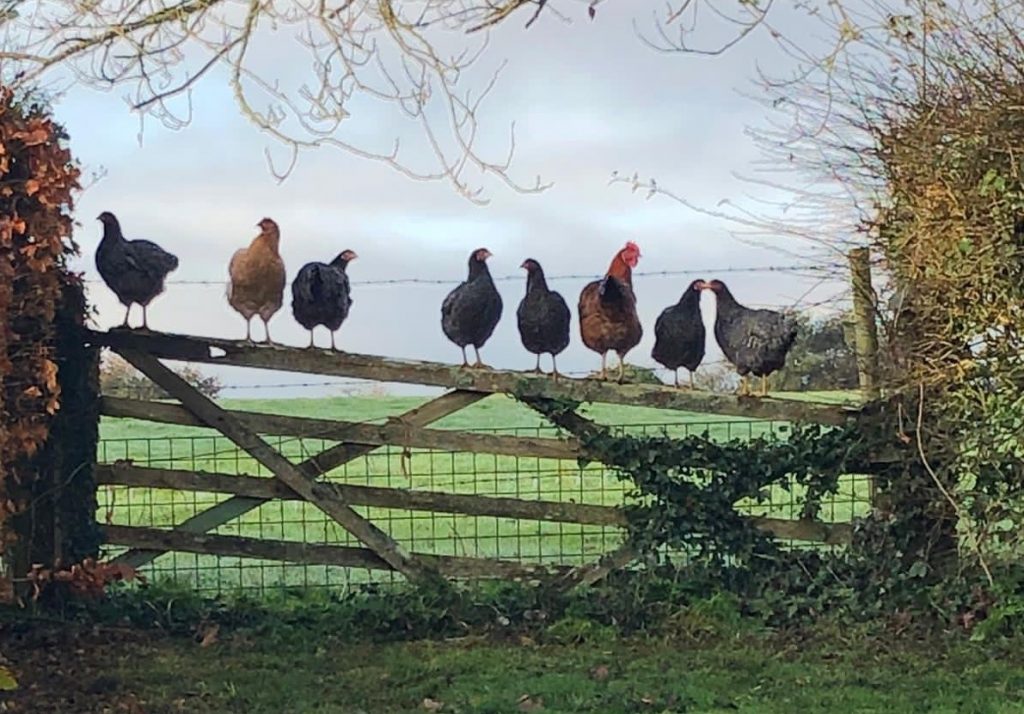
Our neighbour Emma caught this great picture of some of our hens, before they were hit with their own lockdown. The avian flu outbreak which has broken out in various places in the UK, has led the government to take some pretty stringent measures:
The Chief Veterinary Officers for England, Scotland and Wales have agreed to bring in new measures to help protect poultry and captive birds, following a number of cases of avian influenza in both wild and captive birds in the UK.
The new housing measures, which will come into force on 14 December, mean that it will be a legal requirement for all bird keepers to keep their birds indoors and to follow strict biosecurity measures in order to limit the spread of and eradicate the disease.
Public health advice is that the risk to human health from the virus is very low and food standards bodies advise that avian influenzas pose a very low food safety risk for UK consumers, and it does not affect the consumption of poultry products including eggs.
Government Chief Veterinary Officers are encouraging bird keepers to use the next 11 days to prepare for new housing measures, including taking steps to safeguard animal welfare, consult their vet and where necessary put up additional housing.
In our own case, we have prepared a larger house for our hens, and moved them after they roosted one evening. They would much prefer to wander the farmyard as usual, picking up grubs, spilt grain, and nibbling on grass and weeds, which all helps them to produce lovely deep yellow yolks. We don’t know how long they will need to be kept indoors, but in the new house our 17 hens have plenty of room. It is the large scale free-range poultry keepers and their hens that I feel sorry for, where the whole point of the business is that the hens are outside every day, and the houses may well not be suited to full time occupancy.
The hens and cockerel in the picture were one of our several lock-down projects back in the spring, bought as eggs through the post, 11 out of the 18 purchased eggs hatched, 4 being cockerels. These hens have yet to begin laying, but will hopefully start in January as the days begin to lengthen. Three of the cockerels have already found their way into the cooking pot, and very tasty they were.
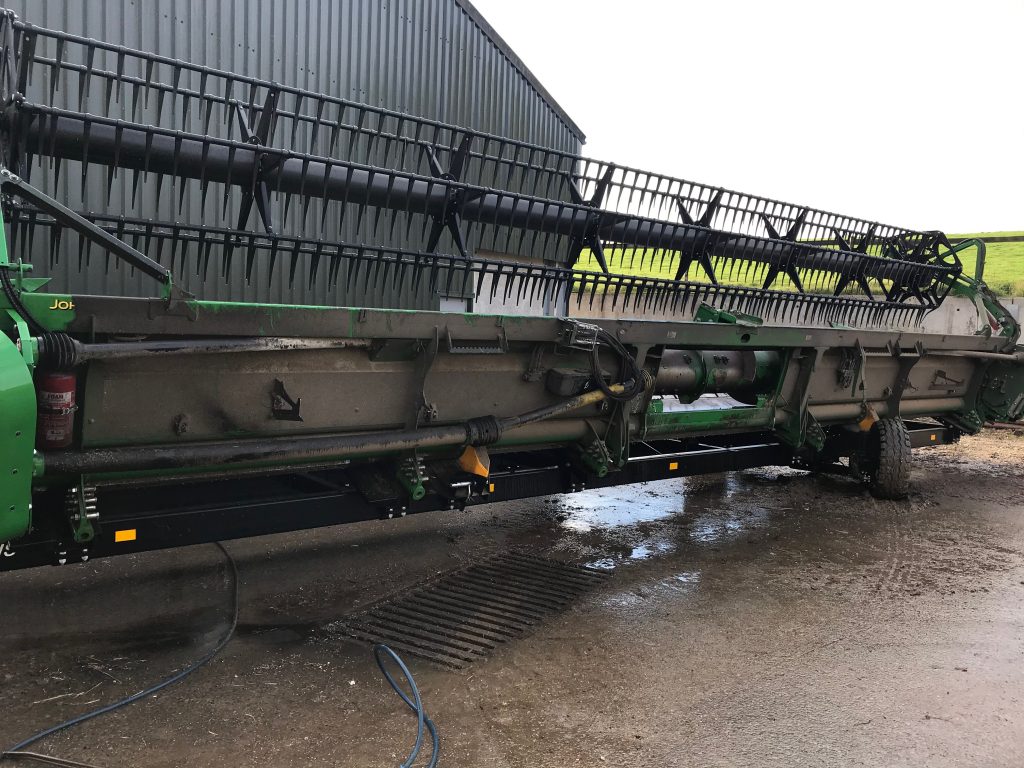
Always good at putting off the less enjoyable jobs, the list of excuses finally expired, and the header got its annual wash, and painting of the shiny bits, last week. No matter how much effort is put into blowing off the combine at the end of every day during harvest, the dust gradually accumulates and sticks on. It is quite satisfying rediscovering that lovely JD green underneath, although care must be taken not to blow off the safety decals and greasing diagram. I was hoping that cleaning the header might encourage someone else to do their duty with the rest of the combine….. Admittedly a rather longer job.
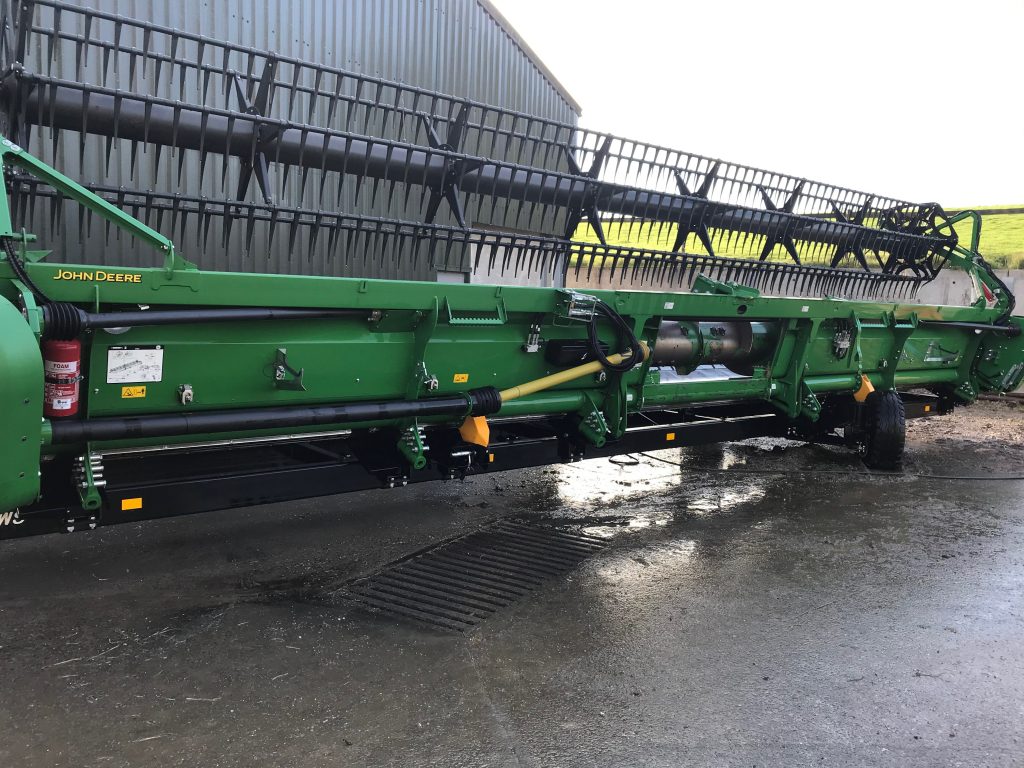
Wessex Internet have been busy in the fields around Durweston, where they have been burying fibre so that they can supply every household in the village with superfast broadband, up to 100 megabits per second if you so wish. This is a welcome progression for otherwise connectivity-impoverished rural communities. The government has a generous scheme to subsidise this, and fortunately we have a wonderful local business who have the wherewithal to provide. If any Durweston readers fancy souping up their internet, get in touch with Wessex to express interest. Luckily most of the work was done during a dryish period in November, and hopefully what mess there is will grow away pretty quickly in the spring.
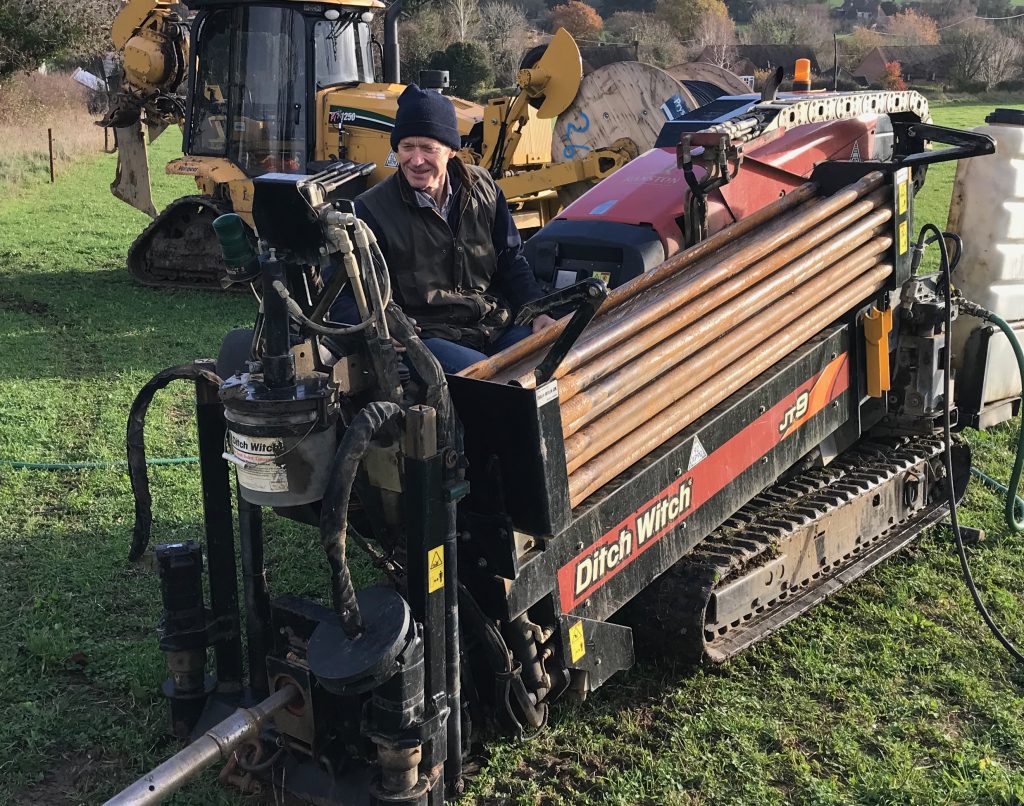
Initially they are supplying the schools, but along the way they have left strategic coils buried, to enable individual household connections to be made. The ditch witch is a drilling machine that can bore under the ground up to 150m distance, enabling the company to cross rivers or other hazards, and to cross gardens without making a mess, the drill bit is so accurate it can be aimed to come up under the boot scraper by your front door.
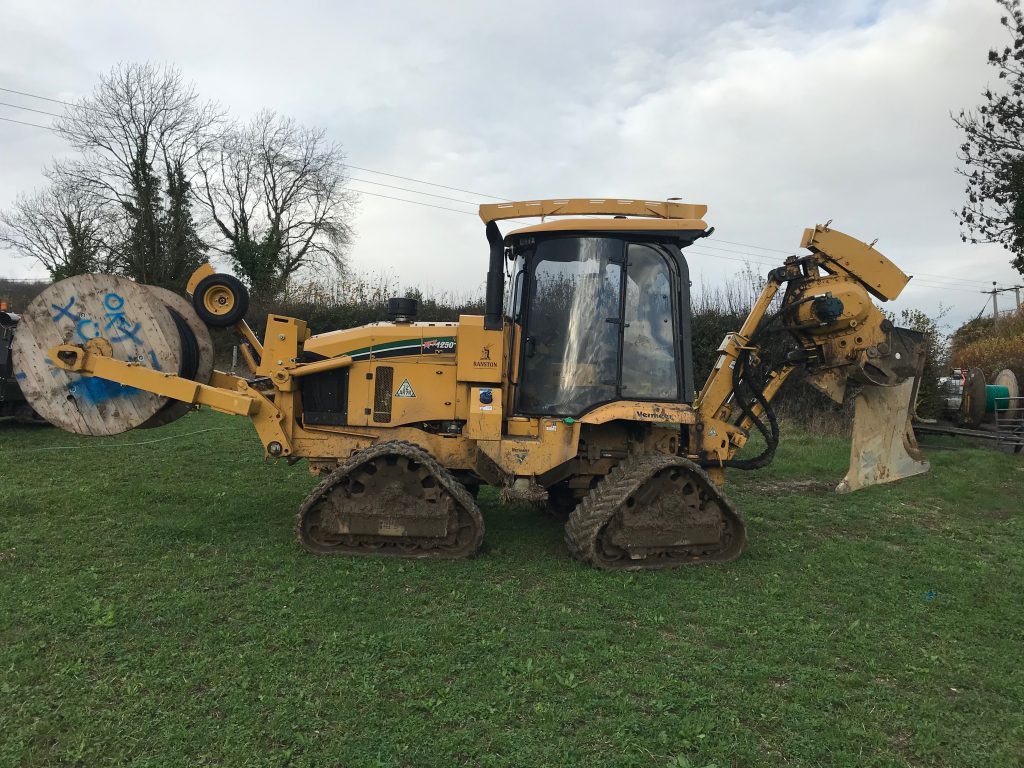
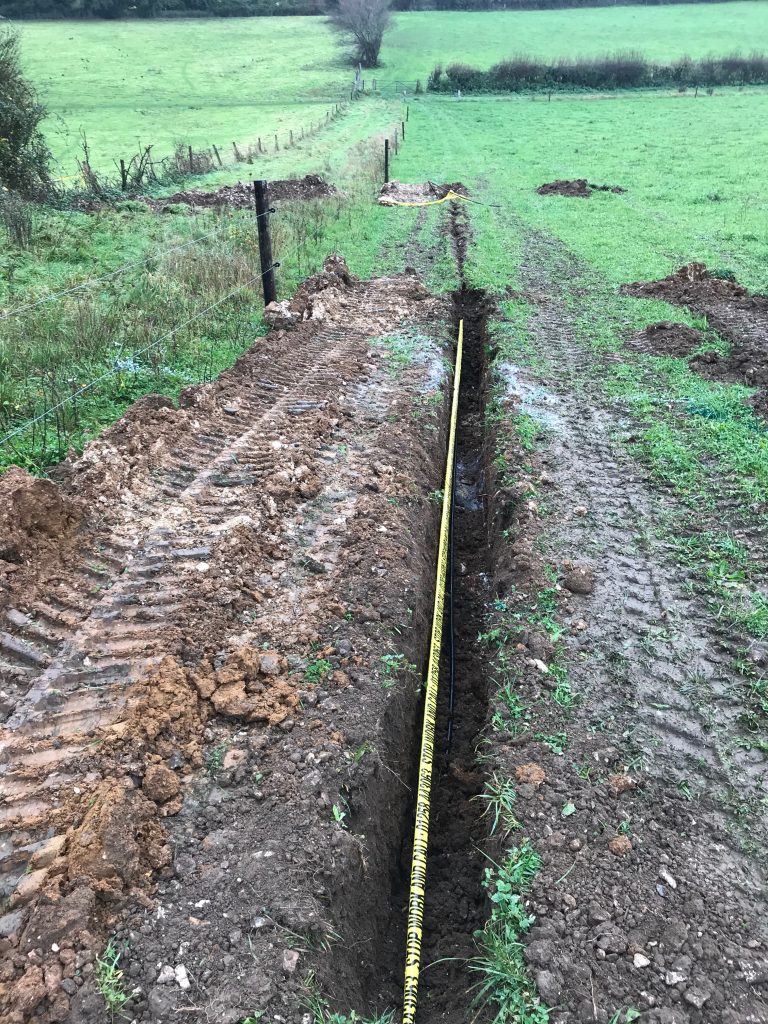
The mole plough pulls the fibre optic cable into the ground, and lays a yellow plastic warning strip a foot above the cable. The tracks mean that not too much mess should be left in the field when it has been past. The machine can lay several kilometres of cable on a good day, when the soil is easy going. Wessex Internet have laid over 1600km in the last 6 years, mainly in Dorset, they continue to expand their network, which is based in Shroton north of Blandford, and bring reliable and very fast internet right to the rural home, not just to the cabinet in the street, which is as far as most other suppliers will go.
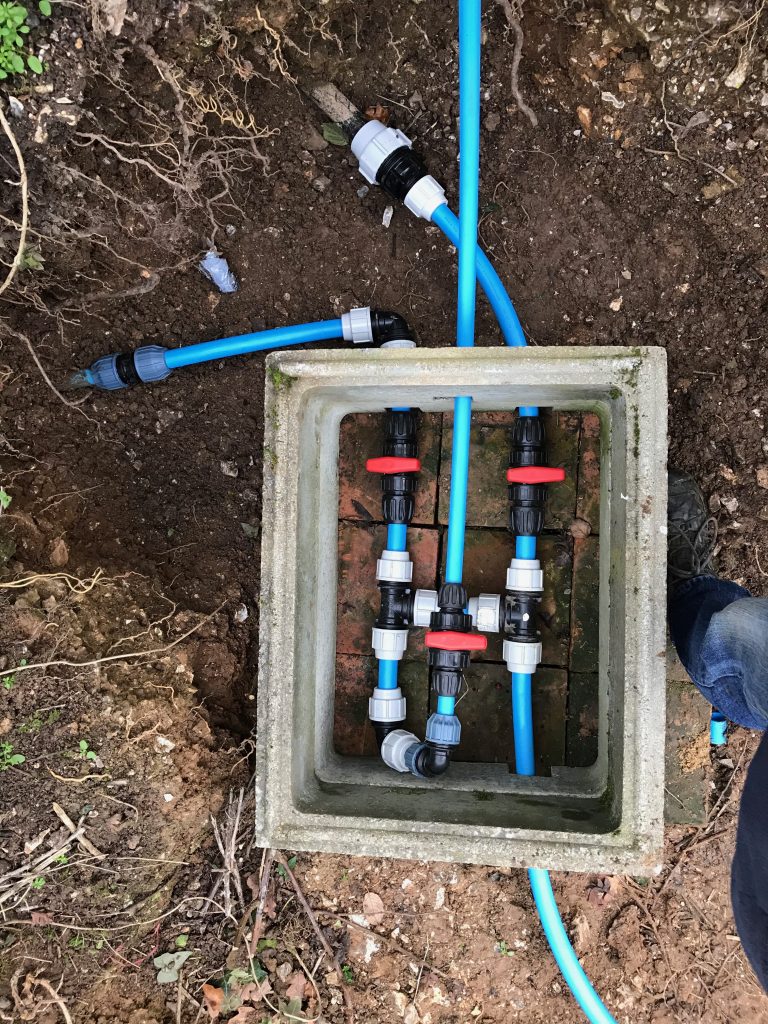
A burst pipe and seized valves in a broken trap have now been mended by a repair that has restored several water supplies in one go.
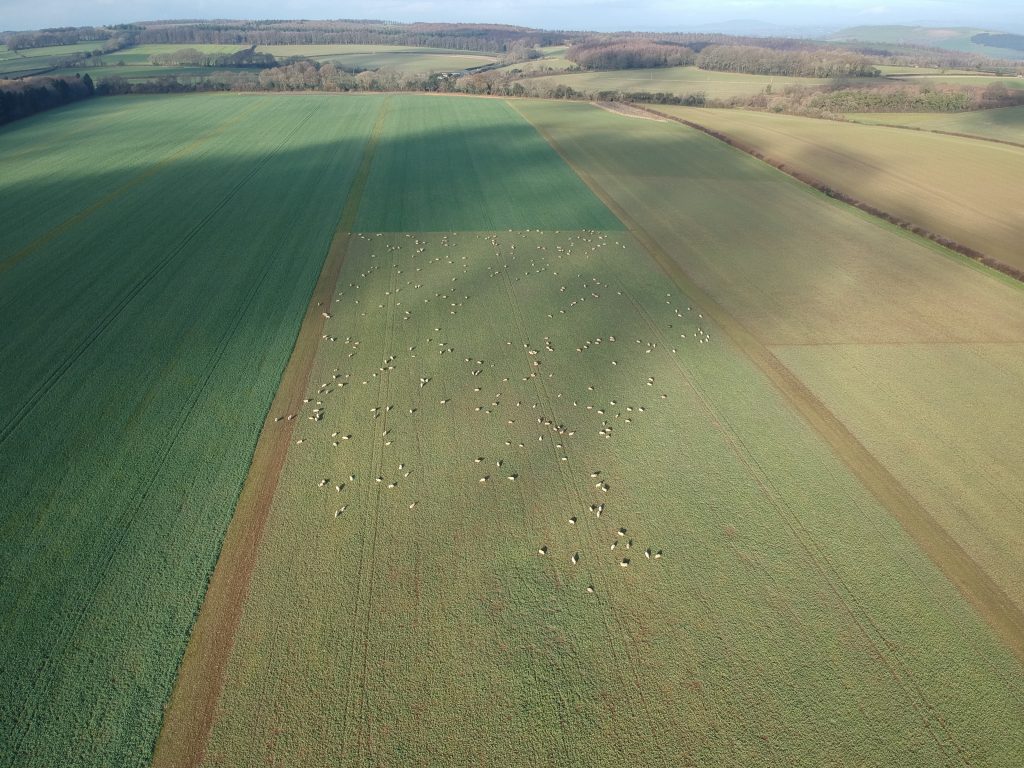
Happy sheep grazing their way across a 110 acre field of rape on a sunny morning.
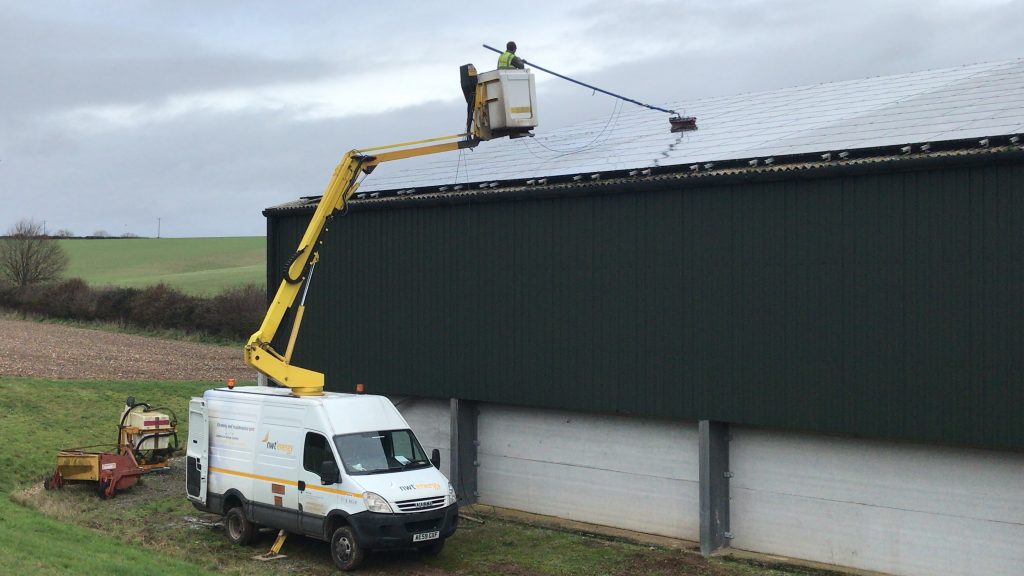
The Landlord’s solar panels on the roof of our grain store get some long overdue sprucing up
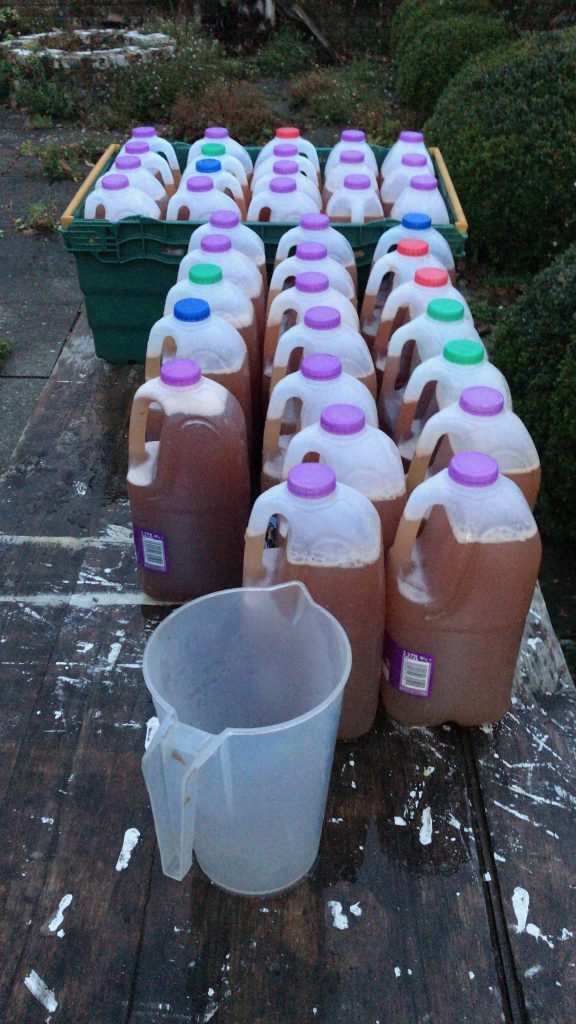
Delicious apple juice from a few hours of intense squeezing back in November
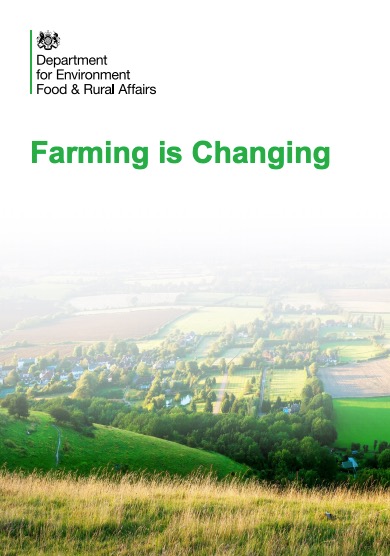
OPINION – Comment on Agriculture bill for Forum Focus magazine.
“This is an exciting time for English farming. We will be phasing out Direct Payments and introducing a new system that rewards farmers and land managers while delivering additional public goods that improve the environment.” DEFRA, November 2020
After the passing of the Agriculture Act 2020, and subsequent announcements from Defra regarding a new dawn for UK agriculture a few weeks ago, followed by the PM’s statement relating to speeding up the UK’s transition to carbon neutral, I believe our esteemed Editor is expecting some comment from her agricultural correspondent:
The new Agriculture Act is full of laudable objectives, but precious little detail on how they will be achieved. What it does spell out is that we are going to have our food subsidy payments slashed well before there are any new schemes available that will pay us for ‘public goods’. Why is cheap food not a Public good? The pessimist in me suggests that in 4 years’ time the wheels could have fallen off, and the new ELMS (environmental land management scheme) won’t even have begun.
It looks like we are certain to lose the ability to make a profit from producing most food in England, because the subsidies are ending. World food prices will have to rise a great deal to make up the difference, and this is highly unlikely because everyone else in the world will continue to subsidise their agriculture. Even Wales Scotland and N Ireland will be able to subsidise their agriculture if they so wish, because this is a devolved matter. Like them or hate them, subsidies have enabled us to produce food below the true cost of production for decades, and also to compete with imported foods which are produced using methods which are illegal here. When farmers have been able to make a profit from food production, they have in very many cases invested in environmental improvements, though we don’t often see this reported in the media.
Now let’s flip the record:
Subsidies have done an immense amount of damage, they have encouraged many farmers to become lazy. Farmers always know that the subsidy cheque will arrive in December, and they will survive another year doing much the same as they have always done, and too often with little regard for the environment. These schemes at one point even penalised us if we wanted to leave land out of production to benefit wildlife. Europe has seen a catastrophic decline in its wildlife because the land has been milked for all its worth in pursuit of profit. Not only this, but pig and poultry farmers, and many horticultural growers, have been outside the subsidy scheme so have had to compete on a very uneven playing field, for example where land attracts subsidy for the grazing animal sectors, but intensive sectors which use little land get none, but still have to compete in the market place.
Ending subsidies, and simply paying farmers for environmental enhancement and not food production under the new act will result in a huge improvement. Food production will be less pressurised to be profitable, we can produce more of what we need at home, and import less. Farmers will swiftly rise to the challenge and will happily learn the new skills required.
These arguments are full of holes, but like the BBC I am trying to be even handed, even when faced with such polarised opinions and widespread ignorance at a national level.
By the time you read this we will know if we have left the EU with or without a deal, and if we got a deal, how oven ready it really was.
Will we have tariffs, and tariff rate quotas on goods leaving the UK as well as those entering? Will we be able to attract foreign labour to help harvest our fruit and vegetable crops? Will we have protection from imported foods produced by methods that are illegal in the UK? These are huge questions, which go to the heart of the future of England’s agriculture, if not the whole of the UK. We have been exhorted by government to prepare for Brexit, but how could we prepare when we have at no time had any idea what markets we will still have access to? We laid the foundations for our production cycle very many months, if not years, ago. How likely were we not to put our ewes in lamb, or even to have sold all of our sheep because we feared no-deal at the end of this year? That would have been ridiculous if we ultimately sail through with the kind of deal most businesses in the whole country have been screaming out for. Farmers in general have to be optimists, otherwise they wouldn’t plant crops, or begin the next production cycle with their animals, which for cows is more than two years ahead of having something to show for it.
Lastly, how can the PM announce his carbon reduction policy before he has begun to think realistically about how it will be achieved? Climate change is the biggest threat facing humanity, and farmers everywhere can make a huge difference in putting it right, if they are given the right signals.
Farmers operate the largest solar panel in the country (the land), and they have the ability to reduce CO2 levels by sequestering carbon, into crops, hedgerows, trees, and most importantly carbon rich soil, permanently, where it will help us to grow better crops, needing fewer harmful inputs.
At the same time we can feed much of the nation, and start to repair the damage done to ecosystems over the last 70 years. But did Boris mention farmers, land or carbon sequestration (trapping it in the soil) ? No he didn’t.
It is impossible to squeeze all the different angles of this story into a single piece of writing, I have only scratched the surface. I am confident that there are people within DEFRA who fully understand the enormity of the job they have been given by the politicians, and they are working very hard with the farming community to deliver an outcome that suits all parties. It will take a long time to work through to a satisfactory conclusion, and many farmers will find it extremely difficult to adapt and change their practises. We have a lot to learn, a need for understanding, and the right kind of encouragement to turn things around. I seriously believe that in order to achieve this we need a network of farm extension officers, with no commercial axe to grind, who will be able to visit all farmers as a trusted advisor, to help them learn new techniques, to apply for schemes relevant for their particular land, and to gently persuade them that some of their activities may need revising, or ending, in order to meet modern environmental standards. Unless farmers get access to this kind of help, we are likely to fail in our quest to move towards a more sustainable and climate friendly agriculture.
STOP PRESS – We got a deal, which is a huge relief, so there will be no tariffs or quotas. On all the other issues, the devil will be in the small print, yet to be revealed. The government has also announced a rise in the numbers of seasonal agricultural workers visas for next year, to 30,000. Welcome, but still far short of the 60,000 the industry needs across the season to pick fruit and veg, and fill numerous other positions. Free movement ends at midnight on December 31st, but we will still need people to help harvest next year’s crops. This year’s experience showed that there are not enough people in the UK prepared or able to fill these places.

We got a deal and we will carry on importing almost half the pigmeat consumed in this country tariff free. We used to produce all of out home consumed pigmeat here until our welfare rules almost halved the British pig herd as we couldn’t compete with the lower cost pigmeat produced abroad.
Produced then, as it still is, by methods illegal in the UK chiefly by the mebers of the other 27 countries in the EU.
We were unable to defend our high cost pig producers from the influx of cheaper foreign pigmeat because of EU rules preventing us using this as an excuse for banning imports.
Incedently WTO rules also prevent discrimination based on animal welfare and so we may end up with no pig industry at all if the US (subsidised) pigmeat is allowed over here with it’s even less welfare friendly production methods which inlcude the use of hormone growth promoters.
In the end, producing less food here because the whole UK countryside has been turned into some sort of ‘Countryfile Idyll’ will just mean more animal welfare abuse and habitat destruction abroad – where of course it is all OK for the Great British Public (or at least the vast proportion who don’t have to worry about the cost of food) as out of sight is out of mind.
Didn’t we use to have a network of farm advisors as you suggest we now need. Was it not called ADAS or something?
This is the best explanation I have read, setting out both sides and in plain English too.
Thank you for all the information that a lot of people will not get to hear. excellent report.
I support coming out of the EU, as it ruined the poultry industry in this country by the rules that , The Germans made ,English went OTT, and the French, went up yours ! perhaps you will forgive me for saying this but it certainly changed my life.
You could become a Trusted Advisor.
Once again George you will have opened the eyes of the largely blind general public, to the intricacies of modern farming and food production, you have certainly made me think!! I wish you continued success in your endeavours.
As ever, George, a lucid, honest and practical account from the hill top of Dorset. From the marshes of Sussex, where food production is simply the tragedy of the common, the chance to come off thie food producing treadmill and instead manage our landscape to maximise biodiversity and public enjoyment is really exciting. As you clearly state, the viability of the vision lies in the detail of Elms which we do not yet have. Mr Gladwin…I do not see this as a country file idyll! Nor as park keeping. More the measure of true civilisation, and an essential service to human need and biological resilience. We have to get behind nature to undo the desolation that now permeates the whole of our countryside.